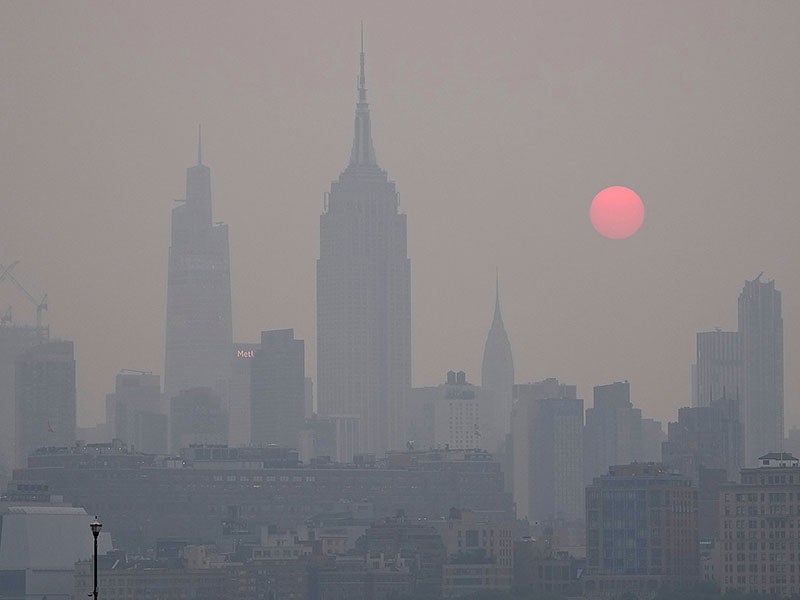On Renewable Energy, It’s Up to You, New York
Sixty groups submitted a letter asking the Public Service Commission to step up efforts to meet New York’s renewable energy targets
In 2019, New York enacted the pathbreaking Climate Leadership and Community Protection Act (CLCPA), which requires steep reductions in greenhouse gas emissions to stave off the worst of the climate crisis.
The CLCPA mandates that by 2030 greenhouse gas emissions across all sectors of the economy be reduced 40% from their 1990 levels, and that by 2050 emissions be reduced 85% from 1990 levels. To support these deep emissions cuts, the CLCPA requires New York to clean up its electric grid. Specifically, New York State’s electricity must be 70% renewable energy by 2030 and zero-emission by 2040. The CLCPA tasks the Public Service Commission (PSC), which oversees utilities and the entire electric sector, with implementing a program to meet these renewable energy targets, alongside the New York State Energy Research and Development Authority (NYSERDA).
The CLCPA directs the PSC to report on its renewable energy efforts every two years. On July 1, 2024, the PSC and NYSERDA issued a draft review of the program, stating that “a delay in achieving the 70% goal may be unavoidable,” and setting forth proposals for achieving a 70% renewable energy grid by 2033. As explained in the letter submitted by 60 organizations today, and further detailed in Earthjustice’s comments, also filed today, the conclusion that the State might miss the statutory deadline is both premature and wholly unacceptable for current and future generations of New Yorkers who are increasingly feeling the impacts of climate change on their health, families, homes, neighborhoods, and communities.
The 2030 deadline is foundational to meeting New York’s future climate targets, including the requirement that New York achieve a zero-emission electric grid by 2040. Missing the 2030 deadline imperils New York’s mandates to aggressively reduce greenhouse gas emissions starting this decade until 2050. Moreover, waving the white flag six years ahead of the 2030 deadline is unnecessary, and emboldens fossil fuel interests and risks signaling to renewable energy developers that New York is not serious about expanding the industry here — and we are, as we must be, in order to meet our climate targets.
The PSC’s determination that the State might miss the 2030 deadline appears to be based on recent trends in renewable energy development. But the past five years have been anomalous — including a global pandemic that led to unforeseen inflation and supply chain challenges — and there is every reason to expect that renewable energy development will speed up if the State provides the right support. Many clean energy technologies have seen exponential growth over the last few years. A lot can happen in six years. New York is already ahead of schedule on our distributed solar energy targets. The price of energy storage is dropping, and clean energy capacity is rising. New York recently enacted legislation to streamline renewable energy and transmission siting, which are key to advancing renewable penetration.
Additionally, the State can and must do more to rein in electricity demand. A primary driver of electricity usage is data centers associated with artificial intelligence and cryptocurrency mining. The State should take steps to protect New Yorkers from affluent, out-of-state companies that consume enormous amounts of electricity. Evidence indicates that these large consumers pay approximately one-tenth of what regular New Yorkers spend on their electricity. The State must better regulate these companies to ensure that they pay their fair share for electricity and do not threaten grid reliability or our renewable energy mandates.
Missing the 2030 deadline would also betray the CLCPA’s equity guarantees, including the requirement that state agencies prioritize reductions of greenhouse gases and local pollution in historically overburdened communities, as well as the goal of decreasing the use of fossil fuel peaker plants located in or near those communities. As the State has acknowledged, failing to meet the 2030 deadline means that dirty, fossil-fuel powered energy facilities will operate for longer. Those facilities disproportionately harm low-income communities and communities of color, and keeping them online prolongs the environmental injustices that the Legislature intended to remedy and reverse in enacting the CLCPA. Meeting the 2030 mandate is a moral imperative.
In enacting the CLCPA, the Legislature found that New York must exercise leadership on combatting climate change. Five years later, we are lagging behind on building renewable energy capacity, a critical piece of the climate puzzle. Rather than forfeit the mantle now, we should redouble our efforts to make New York a climate leader and fulfill the CLCPA’s promise.
Established in 2008, Earthjustice’s Northeast Office, located in New York City, is at the forefront of issues at the intersection of energy, environmental health, and social justice.
